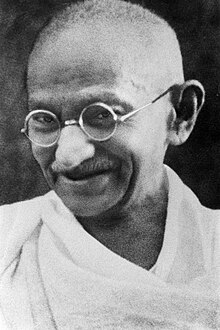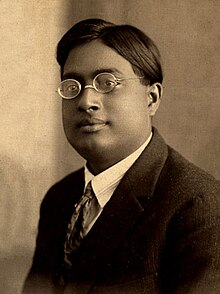Nobel Prize controversies
[2] After his death in 1896, the will of Swedish industrialist Alfred Nobel established that an annual prize be awarded for service to humanity in the fields of physics, chemistry, physiology or medicine, literature, and peace.
[9][10] A more likely explanation is that Nobel did not consider mathematics as a practical discipline, and too theoretical to benefit humankind, as well as his personal lack of interest in the field and the fact that an award to mathematicians given by Oscar II already existed at the time.
[citation needed] A major controversies-generating factor for the more recent scientific prizes (Physics, Chemistry, and Medicine) is the Nobel rule that each award can not be shared by more than two different researches and no more than three different individuals each year.
[27][28][29] The 1918 Nobel Prize in Chemistry was awarded to Fritz Haber for his invention of the Haber–Bosch process, which allowed for the efficient synthesis of ammonia, leading to the economical mass production of chemical fertilizers.
A fourth potential recipient, Douglas Prasher, was the first to clone the GFP gene and suggest its use as a biological tracer; however, he was working as a courtesy shuttle bus driver, a fact which received considerable media coverage.
[48][49] The Lithuanian and Spanish scientific communities expressed disappointment when the committee did not include Virginijus Šikšnys or Francisco Mojica along with Emmanuelle Charpentier and Jennifer Doudna in the award as both of them made crucial contributions to the development of CRISPR gene editing technology.
[57] The controversy resulted in a change to the governing committee: members served three-year instead of unlimited terms[58] and the prize's scope expanded to include political science, psychology, and sociology.
In 2008, Horace Engdahl, then the permanent secretary of the academy, declared that "Europe still is the center of the literary world" and said that American writers did not win often (the most recent at the time was Toni Morrison, 15 years prior) because "the US is too isolated, too insular.
David Remnick replied, "You would think that the permanent secretary of an academy that pretends to wisdom but has historically overlooked Proust, Joyce, and Nabokov, to name just a few non-Nobelists, would spare us the categorical lectures."
Remnick cited Philip Roth, John Updike and Don DeLillo as counterexamples to Engdahl's claim, along with "many younger writers, some of them sons and daughters of immigrants writing in their adopted English.
"[64] In 2009, Engdahl's replacement, Peter Englund, rejected his sentiment ("In most language areas ... there are authors that really deserve and could get the Nobel Prize and that goes for the United States and the Americas, as well"), and acknowledged the Eurocentric bias of the selections, saying that, "I think that is a problem.
[85] Although poor health prevented him from giving his controversial Nobel Lecture, "Art, Truth and Politics", in person, Pinter appeared on video, which was simultaneously transmitted on Britain's Channel Four.
"[97] The 2019 prize awarded to Austrian novelist and playwright Peter Handke came under heavy criticism due to his history of denying the Bosnian genocide and his vocal support for late Serbian President Slobodan Milošević, even speaking at his funeral in 2006.
[98][99] Authors Miha Mazzini, Hari Kunzru, Jonathan Littell, Slavoj Žižek, and Salman Rushdie[99][100][101] each heavily criticized the choice, and it was further condemned by PEN International[101] and Holocaust historian Deborah Lipstadt, who said that the award gave his views a platform that "he does not deserve and the public does not need him to have".
[121][122] The American press also reacted with consternation to the award: The New York Times dubbed it the "Nobel War Prize";[118] The Washington Post quoted retired diplomat George Ball as saying that on the evidence "The Norwegians must have a sense of humour.
Kåre Kristiansen, a member of the Nobel Committee, resigned in protest at Arafat's award, citing his sponsorship of terrorism through the PLO and calling him the "world's most prominent terrorist".
[129] The 2002 prize went to Jimmy Carter for "decades of untiring effort to find peaceful solutions to international conflicts, to advance democracy and human rights, and to promote economic and social development".
The announcement of the award came shortly after the US House and Senate authorized President George W. Bush to use military force against Iraq in order to enforce UN Security Council resolutions requiring that Baghdad give up weapons of mass destruction.
If you look at the will of Alfred Nobel that goes directly to what he said that the prize should go to the person that has worked for—he called it reduction of standing armies but in today's terms it means arm control and disarmament. ...
But, there are other things also, which we looked at, for instance, the fact that he started immediately to build bridges to the Muslim world throughout the time.In 2015, Geir Lundestad, director of the Norwegian Nobel Institute (who sat in on the committee's meetings but did not have a vote[142]), wrote in his memoir, Secretary of Peace, that he regretted giving the prize to Obama.
Barry Sautman and Yan Hairong, writing in The Guardian, also criticized Liu's selection for his long support of American involvement in wars in other nations, particularly Vietnam, Korea, Afghanistan, and Iraq.
[177][178][179][180] Willard Boyle and George E. Smith's award for the development of the charge-coupled device led to Eugene I. Gordon and Michael Francis Tompsett claiming that it should have been theirs for establishing that the technology could be used for imaging.
Working there with the experimental data supplied to her by Hahn, she managed, with Otto Robert Frisch's participation, to incorporate Niels Bohr's liquid drop model (first suggested by George Gamow)[199] into fission's theoretical foundation.
"[203] Rolf-Dieter Heuer, the director general of European organization for nuclear research CERN, commented in a scientific meet in Kolkata titled Frontiers of Science that "it is unfortunate that pioneering Indian physicist Satyendra Nath Bose did not win the Nobel Prize for work on quantum physics in the 1920s that provided the foundation of the Bose–Einstein statistics and the theory of the Bose–Einstein condensate".
Golgi strongly advocated the reticular theory such that even his Nobel lecture was a direct attack on Cajal's work and the neuron doctrine, and even depicted a diagram of continuous network which he claimed was "an exact reproduction after life".
In 1991 Howard M. Lenhoff, then Professor of Developmental and Cell Biology at the University of California, published a paper pointing out that Ethel Browne Harvey should have shared in Spemann's Nobel Prize, because, as a graduate student, she had made a similar discovery many years earlier and understood its significance.
[243] The Nobel Prize for Physiology or Medicine was awarded in 1998 to Robert Furchgott, Louis Ignarro and Ferid Murad "for their discoveries concerning nitric oxide as a signalling molecule in the cardiovascular system".
[256][257][258][259][260][261][262] The decision to award the 2010 Nobel Prize for Physiology or Medicine to Robert Edwards for developing the technique of in vitro fertilisation was bitterly denounced by the Catholic Church,[263] which objects to all artificial methods of human conception and fertilization as well as to contraception.
One Vatican official called the award "out of order",[264] and the International Federation of Catholic Medical Associations issued a statement saying that the use of human embryos, created and discarded "as experimental animals destined for destruction, has led to a culture where they are regarded as commodities rather than the precious individuals which they are".
The 2010 Nobel Peace Prize was awarded to Liu Xiaobo while he was serving a prison sentence for "subversion of the state", with the Chinese government not allowing him or his family members to attend the ceremony.



